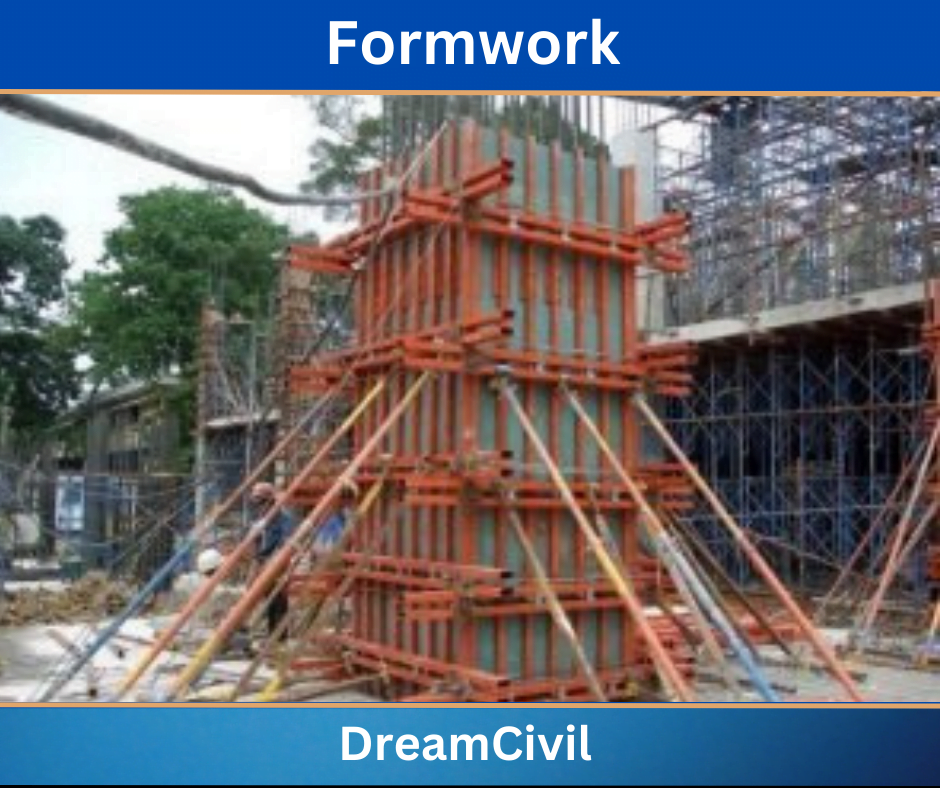Table of Contents
In this article, we will discuss formwork and the types of formwork.
Formwork (also called falsework, centring and shuttering) may be defined as the timber or other materials which are used to form moulds into which concrete is poured at site.
1. Requirements of Good Formwork
The following are the requirements of good formwork:
a. It should be adequately strong.
b. It should be stiff.
c. It should be smooth.
d. It should provide a good shape at the concrete face.
The following points about formwork are worth noting:
a. The joints made in the formwork should be simple. The joints of the formwork should be preferably tongued and grooved to ensure water-tightness and minimize the possibility of the slurry oozing out.
b. The surface of formwork which is to come in contact with concrete is usually coated with crude oil or soft soap solution, to prevent the possibility of concrete getting stuck to it.
c. All formwork must be so made that it can be easily stripped after concrete sets.
d. The formwork should be so designed and constructed that it can be struck in the desired order.
e. Every effort shall be made to minimize timber wastage during the construction of formwork since the cost of formwork may amount to about 20 per cent of the cost of some of the jobs.
f. The formwork should be carefully inspected by the Engineer-in-chief and only after making sure that the formwork is properly made, the concreting process must be allowed.
g. The formwork, during concreting, should be continuously in observation for bulges and other signs of failure.

2. Types of Formwork
a. Timber formwork:
Good timber formwork should have the following qualities:
i. It should be easily available.
ii. It should have a reasonable price.
iii. It should be easily workable (both by hand and machine).
iv. It should be light in weight so that it could be handled and lifted easily.
v. It should be adequately stiff to resist excessive deflections.
vi. It should be reasonably stable to check undue wrapping.
vii. The timber pieces should be free from the usual defects like knots, shaft grains, etc.
Generally, softwood varieties are used for formwork.
Hardwoods are also sometimes employed as formwork for moulds for precast work, wherein frequent reuse of moulds is expected.

b. Plywood timber Formwork
~ Plywood sheets bonded with synthetic resin adhesive are being widely used as formwork.
~ The size range from 1.2 m * 1.2m to 3.0m * 1.20m
~ The plywood-formwork claims the following advantages:
i. High impact resistance.
ii. During use, it does not warp, swell or shrink.
iii. Large-level surfaces are available.
iv. Formwork can be fixed rapidly.

c. Steel formwork
~ This type of formwork is widely used in a situation where the work is large and the moulds have to be used repeatedly.
~ In normal practice, steel forms are fabricated from steel sheets strengthened with angle iron and are clipped together by keys and wedges.
~ The steel forms are best suited for circular columns and flat slab construction.
~ The steel formwork claims the following advantages (over timber formwork):
1. They can be easily erected and do not need many adjustments as the units are standardized.
2. They give a smooth surface, which needs very little finishing.
3. They are economical for large works, as there is no damage of any kind.
4. They are not liable for shrinkage or distortion.
5. There is no danger of formwork absorbing any moisture from concrete.
6. Unskilled labour can be used for their erection.
7. They can be used for several times.

3. References1. Content Filter & Authenticity Checking Team, Dream Civil International (Our team checks every content & detail to maintain quality.) |
Read More: Kiln Seasoning of Timber

